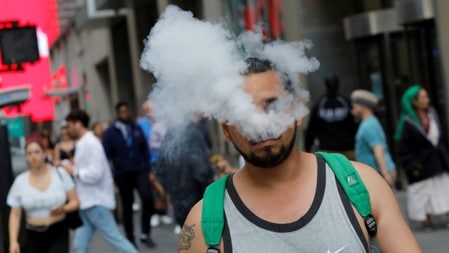By Barbara Goldberg
(Reuters) – When Mike Castellano patrols the beaches of the New Jersey Shore, he is no longer surprised to find discarded vape pens and spent “e-juice” cartridges scattered in the white sand.
A volunteer with Surfrider Foundation, a non-profit group that picks up trash as part of its mission to protect marine environments, Castellano says vaping waste is a problem that has become progressively worse over the last six months.
“You reach down to pick up what you expect to be a seashell and pull up a little plastic pod with some aluminum and some oil on it,” said Castellano, a 28-year-old building supply manager who lives six blocks from the boardwalk in Asbury Park.
While data quantifying the extent of the problem is scant, environmental campaigners are increasingly concerned about the impact of the explosive growth of e-cigarettes in the United States, which the U.S. Centers for Disease Control blames for 26 deaths.
In response, groups around the country are beginning to develop measures to track the amount of vape waste found on beaches, in parks and in other public spaces.
California, often the state that sets the national agenda, has gone further, with lawmakers weighing a bill to outlaw vape cartridges that are not reusable.
“Most people who vape really want to do the right thing but we haven’t made it clear or convenient for them to know what to do,” said Heidi Sanborn, executive director of the National Stewardship Action Council, a lobbying group that helped write the California bill, which has already passed the state Senate.
The legislation, which the Assembly is expected to take up in January, would require producers to provide user-friendly programs to recycle reusable vape products, such as free mail-in packages or drop-off bins at retail locations.
The risks of vape waste are real, experts say. Emptied pods, also known as cartridges, contain residual nicotine, propylene glycol and benzoic acid, while vape pens, the battery-operated e-cigarettes that heat the fluid for vaping, contain lead and mercury that can leach into soil or sand, said University of California at San Francisco researcher Yogi Hendlin.
Non-biodegradable cartridges also pose choking hazards for small children and animals, and endanger ocean creatures that inadvertently consume the plastics, Hendlin said.
Vapor Technology Association, the main trade group, declined to comment. Juul Labs Inc, the vape industry leader 35 percent-owned by tobacco giant Altria Group Inc [MO.N], did not respond to requests for comment.
One of the first attempts to quantify the extent of the problem came in a recent CDC report on litter collected in student parking lots and other gathering spots outside 12 high schools in the San Francisco Bay area. The study, by Hendlin and his colleague Jeremiah Mock, found that e-cigarette waste amounted to 19 percent of trash related to nicotine or cannabis.
Many of the groups dedicated to cleaning up public spaces count the number of cigarette butts and other types of trash that volunteers pick up, but they generally lump vaping waste in the catch-all “other” category.
Surfriders, based in San Clemente, California, is among those looking for specific methods to tally the number of discarded vape products that are finding their way onto beaches.
“It’s important to quantify and qualify – or as we call it ‘fingerprint’ – exactly what’s lying on our streets,” said Jeff Kirschner, who developed a free app called Litterati, which uses artificial intelligence to recognize uploaded photographs of vape litter.
“Once you have the root cause of the problem, that allows you to pave the path to a solution,” said Kirschner.
On the West Coast, Pam Granger doesn’t need a formal study to know the problem is real. The 70-year-old retired policy director said the sight of vape waste has marred her recent walks in a wetlands refuge near her home in Petaluma, California, about 40 miles (64 km) north of San Francisco.
She recalls stumbling on a dissembled piece of a re-usable vape tank, finding a nearly full refill bottle and seeing a vape pod in a playground.
“The grandkids are the ones I’m worried about,” Granger said. “I was horrified.”
(Reporting by Barbara Goldberg in New York; Editing by Frank McGurty and Daniel Wallis)


